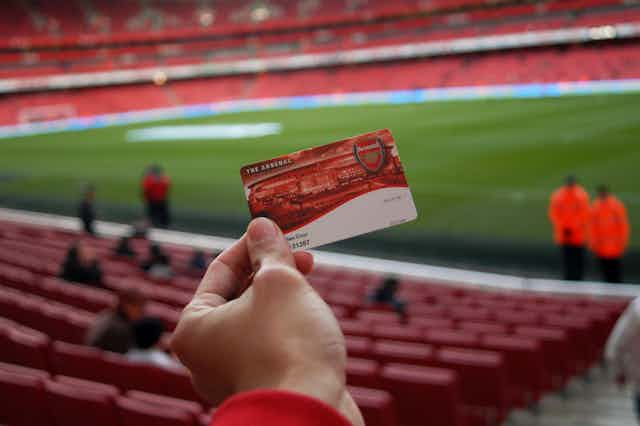Would you prefer a beer right now or a bottle of champagne next week? So begins an interesting new study published today in the journal PloS Biology.
Of course these kinds of choices feature throughout our lives, sometimes with profound ramifications. A fling or lasting long-term relationship? Just one more harmless bet, or your savings for a deposit?
How we consider small, short-term gains versus large long-term windfalls has long been of interest to psychologists and economists. In fact, these mental trade-offs are described in the neuroeconomic literature by the term “hyperbolic decay function”.
It turns out that when rewards are in simple monetary form our choices trace a sigmoid curve (stretched out s-shape). That is, we have high chances of choosing the distant reward if it is large enough, but almost zero chances when we’re talking about small change.
Under these circumstances humans are predictably consistent – how we differ is whether our personalised curve is shifted left (biased towards long-term gains) or right (biased towards short-term gains).
In this field (and this paper) researchers use somewhat pejorative terms for these two styles of thinking: non-impulsive or impulsive.
Sooner or later?
Subjects were asked whether they’d prefer an immediate (“now”) or delayed reward (“in a month or year or in ten years”) using real world examples from sport, culture and food.
A bowling session today was set against Premier League football tickets next year; a packet of chips pronto versus lobster in the Tour Montparnasse restaurant in ten years time (the researchers were French, after all).
Subjects did two versions of this forced-choice task. One was with the delayed scenario provided as text, so participants had to use comprehension and imagination to figure out if they wanted it. In the other, a simple monetary reward was used as the delayed choice option.

The first result was to show that imagined long term choices behave just like concrete monetary choices, however, not based on their dollar value but on how much the participants ‘like’ them.
The team also showed that likeability of imagined outcomes was loosely related to the number of imagined details (dinner at Montparnasse, with Sophie Marceau, in a lowcut dress). Clearly, these are not independent; we generally like more expensive rewards and these tend to excite our imagination.
The next observation was, however, quite novel. Those subjects who tend to imagine the delayed reward more richly (with more reportable details) also tend to produce less impulsive choices.
The brain’s involvement
When young adults performed the same task inside a MRI scanner, the dorsolateral prefrontal cortex was strongly activated in those who prefer the far-off-but-more-valuable reward over the immediate-less-valuable reward, regardless of whether they were imaging the scenario or were simply flashed a cash sum on a screen.
This is completely in accord with current neuroscience understanding of this brain structure, critical to inhibiting automatic behaviours and “keeping us in control”.
The next finding was compelling. When a long-term reward was imagined, the hippocampus, that part of the brain well known to play a vital role in memory, - and mainly left hippocampus - was specifically activated during non-impulsive choices.

And when researchers looked at each individual’s hippocampus activity, they could predict (loosely) whether that person had made a non-impulsive choice.
These functional differences in non-impulsive choices also translated to structural differences in the hippocampus. Surprisingly, given the relatively crude method used, the team found that those individuals who gravitate to long-term imagined rewards also had more dense grey matter in the hippocampus (though not necessarily a larger hippocampus).
Future memories
This work therefore links to other research that recasts the role of the hippocampus as not just for memory of past events, but for memory of the future.
“Prospective memory” is our ability to remember to do something tomorrow, next week or next month. Recent research has shown that the hippocampus is critically important for such mental time travel, a key part of brain circuits that help us not only store and look up information, but also skip forward in time and imagine and populate the future.
This research may also help explain a particularly strong but curious result from our own lab.

We found that older people who had been in charge of more than ten people in their working lives not only had a larger, healthier hippocampus, but their rate of hippocampal shrinkage was almost five times slower than those who had never supervised another person. And this result was strongly left-sided, just like the results from the French team.
On a speculative basis, it is possible that the routine mental time travel of supervisors, weighing and imaging future long-term gains (for themselves and their staff or students) against short-term outcomes leads to major benefits to hippocampal structure.
But what is the direction of causality here? Does hippocampal structure and function drive non-impulsive decision-making through imagined detail, or is the other way around? Cognitive neuroscience is replete with these chicken-or-egg conundrums.
The final act of the paper tries to tackle this issue by studying patients with neurodegenerative disorders, but the wheels fall off somewhat. Patients with Alzheimer’s have hippocampal damage, and so following the team’s argument one would expect severe impairment in imagining delayed rewards.
Yet it was frontal lobe dementia patients, with known damage to the dorsolateral control system, who (unsurprisingly) performed the worst at both non-imagined and imagined non-impulsive decision making.
The wisdom of mapping brain-behaviour relationship revealed in healthy university age adults straight onto older individuals with multiple long-standing and overlapping brain diseases is also dubious.
Overall, the real value of this work is to provide a new insight into the psychology and biology of imagined reward choices.
The better we can imagine delayed rewards in rich detail the more likely we are to choose them over immediate gratification – and the hippocampus seems to be a key part of this process.

